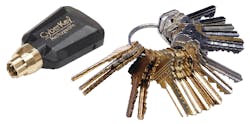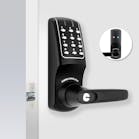For thousands of years, mechanical locks and keys have been securing access to properties and assets. The oldest known lock was found by archeologists in the Khorsabad palace ruins nearNineveh; the lock was estimated to be 4,000 years old. In the last decade, between new developments in technology and the demand for higher security, numerous advancements in access control technology have emerged, making mechanical locks and keys more secure than ever.
However, even with all the new technological advancements, mechanical locks and keys still have several vulnerabilities. When evaluating high security locks, it is important to include electronic lock systems as the added security and cost savings overtime could be significant.
Electromechanical systems are proving to be an attractive blend of the best of traditional mechanical locks and conventional key card access control systems. They empower the end user by giving them the ability to control their own system and electronically change access to any lock cylinder or key onsite and obtain audit information. Installation is as simple as replacing existing mechanical lock cylinders with an electronic lock cylinder. The net result is a quick, and affordable, increase in security, safety, and key control.
Electromechanical access control systems offer several advantages over traditional locks and keys.
- Smart keys cannot be duplicated
- Electronic locks do not have a keyway that can be picked or bumped
- Keys can be deactivated if lost or stolen
- Both the lock and key record access granted and access denied events to memory
- Keys can be programmed based on time, date, and authority level, so only authorized users can gain access
These electromechanical systems typically have four main components: electronic locks, smart keys, downloading devices, and management software. Each of these components provides a specific functionality within the system to increase security and accountability.
Electronic cylinders replace standard mechanical lock cylinders and don’t require wiring, power, or batteries. The locks store all access events in memory, both granted and denied, and can be interrogated in the event a key is lost or stolen. Standard features built into these cylinders include:
- No pick-able keyway
- Tamper resistance
- Torque resistance
- Stun gun resistance
- Dual key entry or time delay
Smart keys store the user’s access control permissions as well as information about which locks the user has accessed or attempted to access.
Downloading devices act as the conduit between the smart keys and the management software. These ‘communicators’ re-authorize the smart key schedule of permissions while simultaneously downloading recorded events from the key’s memory and transferring all of the information to the database on your computer.
Finally, the management software is the intelligence driving the entire system. Software packages offer a wide range of management tools to accommodate every type of installation, from small single location businesses to multinational corporations.
CyberLock Secures Historic Broadway Center
Broadway Center for the Performing Arts in Tacoma, Wash., began operation in 1983, but its buildings have been a vital part of the town for 90 years. Broadway Center’s Pantages Theater was originally a vaudeville house and the smaller Rialto Theater was a silent movie palace. In 1994, Broadway Center added a third theater, Theatre on the Square. Situated at an intersection that has been the town’s center for generations, Broadway Center is at the very “heart” of theTacoma community.
Broadway Center has a staff of 85 full-time and part-time employees and a volunteer base of 200 people. They needed to control and manage access to their theaters, rehearsal halls, classrooms, and an office building.
Access control is a challenge for many facilities likeBroadwayCenter, as one misplaced key represents a crack in the armor that protects against unwelcome intruders. With many keys in circulation, security to their buildings was compromised whenever a key was lost. They couldn’t afford the time and expense to re-key every time a key was missing.
The path to finding an access control system that could meet their requirements proved challenging. David Fischer, executive director of Broadway Center, says, “The Rialto and Pantages Theaters were built in 1918 and are listed on the National Registry of Historic Places. We required a system that could be installed without altering their historic nature.”
Fischer explains, “We looked at card access systems but they would have significantly altered the interior and exterior look of our theaters. Our 90-year old buildings have solid concrete walls. The systems would have required us to run surface-mount electricity, which is incredibly expensive. In order to hide the electric runs, core drilling into the concrete walls would have been necessary and of course, this was unacceptable.”
After extensive research, Broadway Center selected the CyberLock electronic access control system, which met all their requirements. No expensive wiring or damaging concrete core-drilling was needed for installation. They simply replaced the cylinders inside their door locks with CyberLock electronic cylinders.
“Theaters are dark and inherently dangerous. There are places to fall into and out of. Knowing that we have only authorized, experienced people in these hazardous areas is an important benefit of the CyberLock system,” says Fischer. They can audit activity at each door and restrict each person’s access to the areas they need to do their job.
After installing CyberLock, those keys were no longer a threat. “With the CyberLock system, we can just deactivate a missing key so it cannot access our doors and our security isn’t compromised. Before CyberLock, key duplication was an issue for us. Now, people can’t just go to a hardware store and make an extra key because the system’s electronic keys cannot be duplicated,” states Fischer.
Fischer adds, “The affordability of CyberLock is an enormous benefit to us, we gained the access and key control we needed without compromising the historical integrity of our buildings.”
James McGowan is vice president of sales and marketing, Videx, Inc. For more information on CyberLock, visit www.videx.com.





